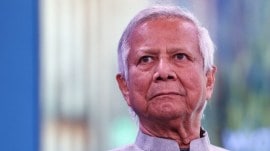
Muhammad Yunus
Bangladesh’s Nobel laureate economist Dr Muhammad Yunus was on January 1, 2024 sentenced to six months in jail by a court on charges of violating the labour laws, a development termed as “politically motivated” by his supporters ahead of the general elections.
The 83-year-old economist won the Nobel Peace Prize in 2006 for his anti-poverty campaign, earning Bangladesh the reputation of being the home of microcredit through his Grameen Bank, which he founded in 1983. Yunus and three of his colleagues in Grameen Telecom– one of the firms he founded– were accused of violating labour laws when they failed to create a workers’ welfare fund in the company.
The Third Labour Court Judge Sheikh Merina Sultana ordered Yunus to serve six months of simple or non-rigorous imprisonment for violating the law as the Grameen Telecom chairman, along with three other executives of the social business company.
The verdict came just days ahead of the January 7 general election in Bangladesh. His supporters have described the judgment as “politically motivated”.
The Nobel laureate is also facing a series of charges relating to labour law and misappropriation of money. The economist was on a protracted row with the incumbent government due to obscure reasons. The Sheikh Hasina-led administration began a series of investigations against him after coming to power in 2008.
Bangladesh authorities began a review of the statutory Grameen Bank’s activities in 2011 and fired Yunus as its founding managing director on charges of violating the government retirement regulations. Many people believe that Hasina became enraged when Yunus announced he would form a political party in 2007 when the country was run by a military-backed government, and she was in prison.
He was put on trial in 2013 on charges of receiving money without government permission, including his Nobel Prize award and royalties from a book.
Hasina called Yunus a “bloodsucker” and accused him of using force and other means to recover loans from poor rural women as head of Grameen Bank.
He was later granted bail after his court appearance. After his prolonged efforts to settle disputes with the government, Yunus blasted the government for paving the way for the “destruction” of the pioneering micro-lending bank he founded.
In August last year, more than 170 global leaders and Nobel laureates sent an open letter to Prime Minister Hasina urging her to suspend legal proceedings against Yunus.
The signatories included former US President Barack Obama, former UN Secretary-General Ban Ki-moon and more than 100 Nobel laureates.
MUHAMMAD YUNUS NEWS
One year after Sheikh Hasina's exit, where is Bangladesh today?
August 06, 2025 6:53 am
Today, Bangladesh is gripped by a politics far removed from the aspirations that fuelled her ouster
Politics in Bangladesh: One year after Sheikh Hasina’s ouster, it is all agenda and no vision
August 05, 2025 7:43 pm
For Bangladesh, it has been a year of “rule by committees”, including the “reform” commissions which were delegated with the task of formalising the textual aspects of the revolution
Ram Madhav writes: Bangladesh, a year later
August 02, 2025 12:43 am
Ahead of elections next year, political space in the country is open for fresh players
Satyajit Ray's ancestral home in Bangladesh and a few untold stories
July 17, 2025 9:50 am
The birth of Bangladesh was a victory of the ethno-linguistic spirit over religious dogmatism. Satyajit Ray’s films and writings upheld that spirit
Sheikh Hasina’s trial needs neutral observers, not partisan judges
July 07, 2025 12:04 pm
Bangladesh’s ICT is an example of both right and wrong — it created a precedent for prosecuting genocide in South Asia, but it neglected due process. Sheikh Hasina is feeling its fallout now
Bangladesh High Commissioner meets Mamata at Nabanna
June 24, 2025 5:32 am
This meeting marked the first courtesy call by the new Bangladesh High Commissioner to any Indian Chief Minister
Writers and artists in Tripura write to Muhammad Yunus condemning vandalism at Rabindranath Tagore's ancestral home in Bangladesh
June 20, 2025 12:04 am
The letter writers say the people of Tripura were 'deeply hurt' by the attack on Rabindranath Tagore's ancestral home at Shahzadpur in Bangladesh's Sirajganj district last week.
Rabindranath Tagore will always be relevant to Bangladesh
June 18, 2025 2:33 pm
His works had a significant influence on the 1952 Language Movement, which eventually led to the emergence of Bangladesh
Bangladesh’s Yunus claims he had appealed to PM Modi over Sheikh Hasina’s online speeches, citing 'unrest'
June 12, 2025 1:10 pm
Yunus, during the interaction, also made a mention of the informal diplomatic note issued to India seeking Hasina's extradition.
‘No way’: Bangladesh interim leader Yunus rules out staying in power after 2026 elections
June 11, 2025 8:11 pm
The Nobel Peace Prize laureate, 84, was appointed to lead the interim administration after Hasina’s 15-year tenure ended in August 2024, following months of protests driven by student activists.
Best of Express
























